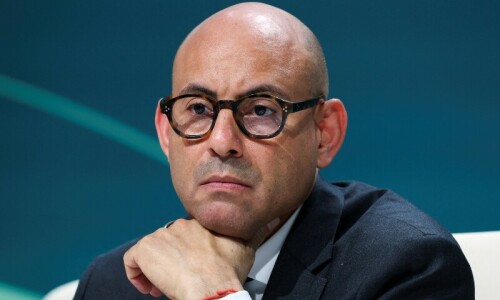
BEIRUT: Lebanon's Hezbollah-dominated cabinet failed Tuesday to adopt a position on a UN tribunal probing the murder of ex-premier Rafiq Hariri which is expected to indict members of the militant group.
A committee tasked with drafting the government programme held its sixth meeting on Tuesday, Prime Minister Najib Mikati's office said in a statement.
But the committee did not discuss how the cabinet would tackle the Special Tribunal for Lebanon (STL), rumoured to be readying to issue indictments naming members of the Syrian- and Iranian-backed Hezbollah in the 2005 Hariri assassination.
“Prime Minister Mikati has not yet launched talks on the clause in the government policy which deals with the tribunal,” a source close to Mikati told AFP on condition of anonymity.
“We are still in contact with all parties in an attempt to find a solution that is acceptable to all those concerned.” Two regional Arabic-language dailies have reported the STL would issue its indictments, which are expected to remain confidential, within days. The tribunal has refused to comment on the reports.
Lebanon for months has been bracing for the Netherlands-based STL to issue its indictments in the Beirut bombing that killed Hariri and 22 others, with Hezbollah repeatedly warning it would defend itself against any accusations.
“Our position against the tribunal is clear,” said Hezbollah-appointed State Minister Mohammed Fneish.
“As yet, there have been no talks as to how the government policy will deal with the tribunal,” Fneish told AFP on Tuesday.
The STL, set up in 2007, for years has been at the centre of a heated debate between the country's two main alliances and led to the collapse in January of the pro-Western government of Saad Hariri, son of the slain Rafiq.
Hezbollah for months had been pressuring Saad Hariri, a Sunni who is close to Saudi Arabia, to sever all ties with the tribunal which the Shiite group says is a US-Israeli conspiracy.
Hariri however refused to disavow the court, and Hezbollah and its allies on January 12 pulled their ministers from his cabinet, forcing its collapse.
With the militant movement's support, Mikati succeeded Hariri as prime minister on January 25 and formed his government almost five months later in which the Hezbollah-led alliance controls 18 out of 30 seats.
Hariri and his allies refused to join what they say is a government controlled by Hezbollah.
But a divide is emerging in the new cabinet over the tribunal, which experts say could delay the formation of a government programme.
While Hezbollah has rejected it outright, Mikati and Druze leader Walid Jumblatt, who have sought to portray themselves as politically neutral, have both said they would not allow Lebanon to abandon its commitments to international resolutions.
“The tribunal is one thing that many Lebanese, in government as well as the people, refuse to let go of,” Social Affairs Minister Wael Bou Faour, of Jumblatt's camp, told AFP on Tuesday.
“We will not pit Lebanon against the international community nor against international resolutions.”















































Dear visitor, the comments section is undergoing an overhaul and will return soon.